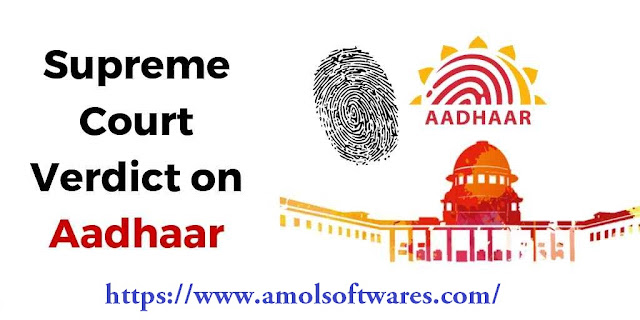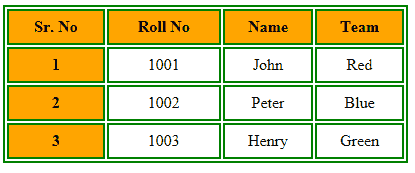New Update Regarding AADHAR CARD from Supreme Court: UIDAI’s Aadhaar Card Is Legal?
While the judgment implies Aadhaar is as yet obligatory for documenting expense forms and to get to welfare plans, financial balances don't need to be connected to it any longer.
 |
| Whether Aadhaar is required or not? |
NEW DELHI— India's Supreme Court has maintained the lawfulness of the disputable Aadhaar character venture, in view of the biometric and individual subtle elements of over a billion Indians.
The dominant part judgment of the court read down Section 57 of the Aadhaar Act of 2016, holding those privately owned businesses can't demand Aadhaar numbers from natives to give administrations.
The court maintained the legitimacy of connecting Aadhaar to PAN cards, proposing that — should the administration wish it — any individual who makes good on wage government expense should have an Aadhaar number at any rate.
Be that as it may, the court held the connecting of Aadhaar numbers to financial balances, as ordered by a correction to the Prevention of Money Laundering Act of 2002, was unlawful.
The court additionally held that instructive establishments and bodies like the Central Board for Secondary Education (CBSE) and University Grants Commission (UGC), and schools and universities, can't request Aadhaar points of interest of potential hopefuls.
Boss Justice of India Dipak Misra, and Justices AK Sikri and AM Khanwilkar conveyed a simultaneous greater part judgment, while Justices DY Chandrachud and Ashok Bhushan conveyed isolate sentiments.
The lion's share judgment, read out in a stuffed courthouse by Justice Sikri, depended intensely on the court's milestone 2017 Privacy judgment.
"I think it is a triumph for the legislature and the Aadhaar specialist," advocate Rakesh Dwivedi, who showed up for the UIDAI and the administration of Gujarat, told NDTV. "This entire judgment, including Justice Chandrachud's, should be taken a gander at comprehensively and the administration should observe the focuses raised by him and check whether they have to change the law to make the framework more grounded."
"At last everyone is attempting to guarantee with the negligible intrusion of protection of individual you can accomplish your target," Dwivedi said.
"Today the Supreme Court has passed a notable judgment on Aadhaar," said Supreme Court Advocate Prashant Bhushan. "They have held a few sections of the Aadhaar demonstration to be illegal."
The court's choice limiting privately owned businesses from requesting Aadhaar numbers, Bhushan stated, would come as a consolation.
The choice will have a gradually expanding influence on the Indian government's intends to utilize Aadhaar as the essential verification of character for residents to get to sustenance apportions, make good on their regulatory expenses, purchase property and even access private administrations like ledgers and cell phones.
The decision will likewise influence India's product, installments, and innovation organizations that have made Aadhaar-empowered installments, and information assembling, a focal board of their plans of action.
The decision evoked blended responses from Aadhaar's numerous pundits.
"A few segments have been struck down, which is a consolation," said Reetika Khera, who has composed broadly on Aadhaar. "Be that as it may, the enormous dissatisfaction is segment 7 ought to have been struck down, which successfully makes Aadhaar compulsory for some, fundamental taxpayer driven organizations."
"The court appears to have fully trusted every one of the affirmations of the administration," Khera said. "Despite the fact that we realize that on the ground the legislature has been damaging its confirmations to the court. It would have been great if the Supreme Court had pulled up the legislature on this."
Chandrachud's Dissent
While a three-judge greater part, on the five-judge seat, maintained the defendability of Aadhaar, Justice Chandrachud conveyed a disagreeing supposition.
Equity Chandrachud said it was unlawful to pass the Aadhaar Act as a cash charge, and held that the program all in all damaged the security of people. He said it was illegal for banks and phone organizations to gather Aadhaar numbers and approached telephone organizations to devastate all current aadhaar records in their ownership with quick impact.
The Case
In May this year, a sacred seat including Chief Justice Dipak Misra and Justices AK Sikri, AM Khanwilkar, DY Chandrachud, and Ashok Bhushan held its request on 27 petitions testing the established legitimacy of the Aadhaar.
The case saw 38 long stretches of contentions spread more than four months. While Attorney General KK Venugopal spoke to the middle, senior supporters, for example, Kapil Sibal, P Chidambaram, Rakesh Dwivedi, Shyam Divan, Arvind Datar, and Rakesh Dwivedi showed up for different gatherings who had recorded petitions against Aadhaar.
The body of evidence against Aadhaar has contended on the accompanying fronts:
The key push of a lion's share of petitions identified with how the Aadhaar database was being utilized as an apparatus of mass observation. In contentions, candidates attracted thoughtfulness regarding the milestone 2017 judgment in Puttaswamy versus Union of India, where the court held that Indians had a privilege to security, and contended that Aadhaar—by configuration—damaged the protection of people and put them helpless before the state.
As Divan, a key backer for the solicitors, expressed, "Our stand is that prominent area does not reach out to the human body."
The dependability of the Union government's technique to pass the Aadhaar Act as a cash charge in 2016 framed another real purpose of contention. The request, recorded by Congressman Jairam Ramesh, asserted that the Act was passed a cash bill to "sidestep the investigation of the Rajya Sabha".
Candidates likewise attracted consideration regarding how the broad utilization of Aadhaar in government conspires, and visit framework mistakes had really confined access for a portion of the nation's poorest natives. The issue was especially intense in the general population circulation framework for sustenance apportions, the applicants contended.
Information Leaks
The administration, as far as it matters for its, kept up that the Aadhaar framework couldn't be utilized for observation, regardless of much proof actually. It additionally demanded that the framework couldn't be utilized to assemble nitty gritty resident profiles, in spite of having been demonstrated off-base.
The Aadhaar framework, the administration held, had prompted a decrease in debasement and spillages in broad daylight plans, especially the general population appropriation framework.
"The Aadhaar Act meets the guidelines and has sufficient shields. The Aadhaar Act is a simple, reasonable, and sensible law. It is incompatibility of a bigger open enthusiasm, including counteracting dissemination of social welfare benefits, avoidance of dark cash and cash laundering..." Venugopal had told the court.
A few Aadhaar-related information spills as of late have demonstrated something else.
HuffPost India will refresh this story as more data is accessible.
This feature of this duplicate has been refreshed to mirror the vagueness on whether Aadhaar is required or not?




0 Comments